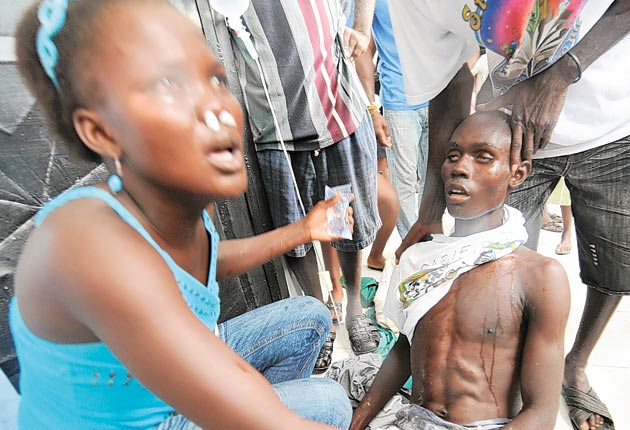Your support helps us to tell the story
From reproductive rights to climate change to Big Tech, The Independent is on the ground when the story is developing. Whether it's investigating the financials of Elon Musk's pro-Trump PAC or producing our latest documentary, 'The A Word', which shines a light on the American women fighting for reproductive rights, we know how important it is to parse out the facts from the messaging.
At such a critical moment in US history, we need reporters on the ground. Your donation allows us to keep sending journalists to speak to both sides of the story.
The Independent is trusted by Americans across the entire political spectrum. And unlike many other quality news outlets, we choose not to lock Americans out of our reporting and analysis with paywalls. We believe quality journalism should be available to everyone, paid for by those who can afford it.
Your support makes all the difference.Scenes of panic last seen in the aftermath of January's earthquake returned to Haiti yesterday as healthworkers confirmed that an epidemic of cholera that had struck the Artibonite and Central Plateau regions of the country had killed at least 194 people and infecting 2,364 more.
Hospitals in the mostly rural area, where tens of thousands of refugees are still living in camps after fleeing Port-au-Prince, are reported to be overwhelmed by patients suffering from acute diarrhoea, fever, and vomiting. Most of the dead are being killed by acute dehydration, sometimes a matter of hours after falling ill.
"I can confirm it is cholera," said Mr Preval, after the results of laboratory tests came through yesterday morning, adding that the highly-infectious disease could spread rapidly through ramshackle camps that house more than one million Haitians. "We are making sure people are fully aware of precautionary measures they have to take to prevent contamination."
The epidemic is centred around the small town of St Marc, where doctors at the St Nicholas hospital began receiving scores of seriously-ill patients late on Tuesday. By Thursday, they had reported more than 500 cases and 12 deaths. With every bed long gone, and more victims arriving by the hour, new patients are being treated as they lie on the ground outdoors.
David Darg, a worker for the humanitarian organisation Operation Blessing International who arrived at St Nicholas on Thursday afternoon, compared the hospital to a "horror scene". The outbreak of the highly-infectious disease has created a volatile mood around the overstretched facility.
"I had to fight my way through the gate as a huge crowd of worried relatives stood outside, while others screamed for access as they carried dying relatives into the compound," said Mr Darg, in a blog entry. "The courtyard was lined with patients hooked up to intravenous drips. It had just rained and there were people lying on the ground on soggy sheets, half-soaked with faeces.
"Some children were screaming and writhing in agony, others were motionless with their eyes rolled back into their heads as doctors and nursing staff searched desperately for a vein to give them an IV. The hospital was overwhelmed, apparently caught out suddenly by one of the fastest killers there is."
The outbreak of cholera has been traced to a river which provides several communities with the water they use for drinking, washing, and irrigation for farming. As a result, Mr Darg said, roads throughout the region are now lined with thirsty crowds, begging for water, and there are signs of growing civil unrest.
"Some larger groups had set up road blocks and our convoy was forced to stop and explain that we didn't have water," he said. "People were constantly trying to flag us down and pointing to sick friends and relatives... [it] reminded me of Haiti's capital Port-au-Prince after the quake: patients lying in the streets, doctors struggling to cope, mass hysteria and fatigue."
The cholera epidemic is the first serious outbreak of a deadly disease to hit Haiti since January's earthquake, which destroyed swathes of the capital and killed an estimated 300,000 people. With barely any of the destroyed buildings yet rebuilt, most of the more than a million people made homeless during the disaster are still living in crowded, squalid camps.
Doctors fear those living conditions could provide a fertile breeding ground for cholera, a bacterial infection which is largely spread by contaminated water. They are particularly concerned since Haiti has not reported a single case of the disease since the 1960s, meaning citizens have little or no immunity to the disease. For now, the epidemic is largely confined to the Artibonite and Central Valley regions, roughly 45 miles north of Port-au-Prince, which were largely unaffected by the quake but absorbed large numbers of refugees in its immediate aftermath. There are fears that it could contaminate the region's rice paddies, which hundreds of thousands of Haitians rely on for their future food supplies.
Public health officials have been touring refugee camps urging residents to regularly wash their hands, cook food properly and only to drink purified water. But that advice has at times only served to inflame tensions in a country that is already bracing itself for the potential upheaval of Presidential elections which are scheduled for the end of next month.
"Convoys of trucks plastered with the posters of various presidential candidates drove up and down the dirt roads," recalled Mr Darg, of his journey to St Nicholas.
"Many candidates saw this as an opportunity to campaign. They were tossing out small plastic bags of water to the desperate crowds. There were fights for the water and one man was crushed under a truck in the scuffle."

Join our commenting forum
Join thought-provoking conversations, follow other Independent readers and see their replies
Comments